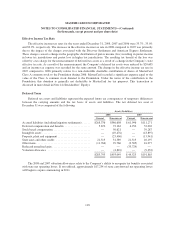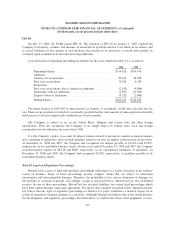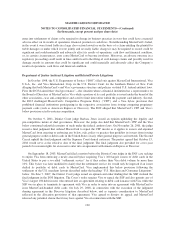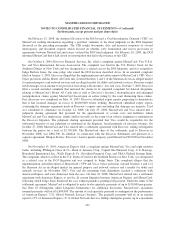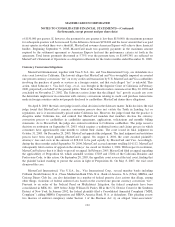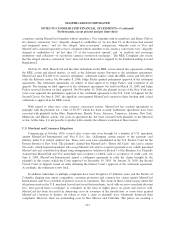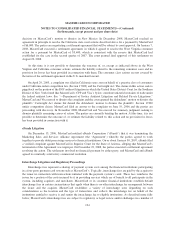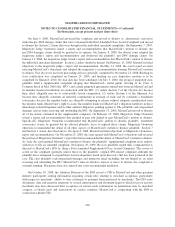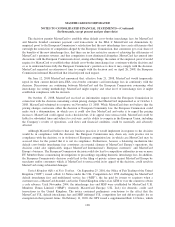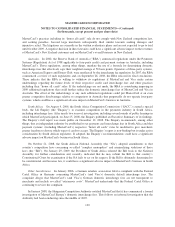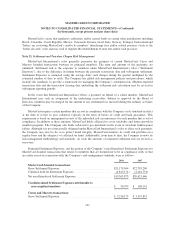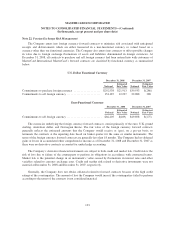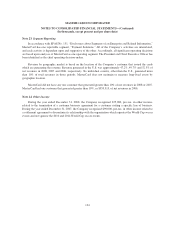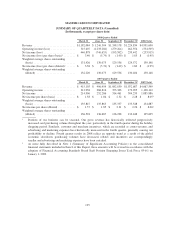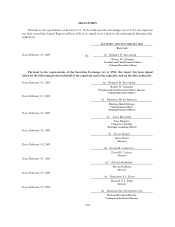MasterCard 2008 Annual Report Download - page 138
Download and view the complete annual report
Please find page 138 of the 2008 MasterCard annual report below. You can navigate through the pages in the report by either clicking on the pages listed below, or by using the keyword search tool below to find specific information within the annual report.MASTERCARD INCORPORATED
NOTES TO CONSOLIDATED FINANCIAL STATEMENTS—(Continued)
(In thousands, except percent and per share data)
The decision permits MasterCard to establish other default cross-border interchange fees for MasterCard
and Maestro branded consumer payment card transactions in the EEA if MasterCard can demonstrate by
empirical proof to the European Commission’s satisfaction that the new interchange fees create efficiencies that
outweigh the restriction of competition alleged by the European Commission, that consumers get a fair share of
the benefits of the new interchange fees, that there are no less restrictive means of achieving the efficiencies of
MasterCard’s payment systems, and that competition is not eliminated altogether. MasterCard has entered into
discussions with the European Commission about, among other things, the nature of the empirical proof it would
require for MasterCard to establish other default cross-border interchange fees consistent with the decision and
so as to understand more fully the European Commission’s position as to how it may comply with the decision.
MasterCard requested an extension of time to comply with the decision and, on April 26, 2008, the European
Commission informed MasterCard that it had rejected such request.
On June 12, 2008 MasterCard announced that, effective June 21, 2008, MasterCard would temporarily
repeal its then current default intra-EEA cross-border consumer card interchange fees in conformity with the
decision. Discussions are continuing between MasterCard and the European Commission concerning what
interchange fee setting methodology MasterCard might employ and what level of interchange fees it might
establish in compliance with the decision.
On October 17, 2008, MasterCard received an information request from the European Commission in
connection with the decision concerning certain pricing changes that MasterCard implemented as of October 1,
2008. MasterCard submitted its response on November 13, 2008. While MasterCard does not believe that the
pricing changes contravene either the decision or European Community law, the European Commission could
make such a determination, in which case it could also fine MasterCard and order it to repeal the pricing
increases. MasterCard could appeal such a decision but, if its appeal were unsuccessful, MasterCard could be
liable for substantial fines and subject to civil suits, and its ability to compete in the European Union, including
the Company’s results of operations, cash flows and financial condition, could be materially and adversely
affected.
Although MasterCard believes that any business practices it would implement in response to the decision
would be in compliance with the decision, the European Commission may deem any such practice not in
compliance with the decision, or in violation of European competition law, in which case MasterCard may be
assessed fines for the period that it is not in compliance. Furthermore, because a balancing mechanism like
default cross-border interchange fees constitutes an essential element of MasterCard Europe’s operations, the
decision could also significantly impact MasterCard International’s European customers’ and MasterCard
Europe’s business. The European Commission decision could also lead to competition authorities in one or more
EU Member States commencing investigations or proceedings regarding domestic interchange fees. In addition,
the European Commission’s decision could lead to the filing of private actions against MasterCard Europe by
merchants and/or consumers which, if MasterCard is unsuccessful in its appeal of the decision, could result in
MasterCard owing substantial damages.
United Kingdom Office of Fair Trading. On September 25, 2001, the Office of Fair Trading of the United
Kingdom (“OFT”) issued a Rule 14 Notice under the U.K. Competition Act 1998 challenging the MasterCard
default interchange fees and multilateral service fee (“MSF”), the fee paid by issuers to acquirers when a
customer uses a MasterCard-branded card in the United Kingdom either at an ATM or over the counter to obtain
a cash advance. Until November 2004, the interchange fees and MSF were established by MasterCard U.K.
Members Forum Limited (“MMF”) (formerly MasterCard Europay U.K. Ltd.) for domestic credit card
transactions in the United Kingdom. The notice contained preliminary conclusions to the effect that the
MasterCard U.K. default interchange fees and MSF infringed U.K. competition law and did not qualify for an
exemption in their present forms. On February 11, 2003, the OFT issued a supplemental Rule 14 Notice, which
128


